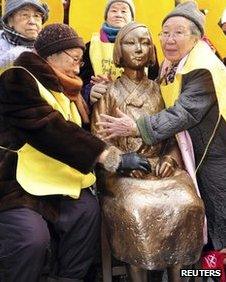Korea 'comfort women' put up statue at landmark rally
- Published

Many Koreans feel that Japan has not done enough to make amends to the "comfort women"
South Korean women kept as sex slaves by the Japanese army during World War II have held their 1,000th rally outside the Japanese embassy in Seoul.
A group of the women and their supporters unveiled a statue of a girl in traditional costume there.
Demonstrators have rallied since 1992 outside the embassy to demand an apology and compensation from Japan.
Japan has repeatedly apologised and has offered lump-sum compensation, but many Koreans say this is not enough.
Japan also says the matter was settled in bilateral agreements with South Korea in the 1960s.
Up to 200,000 women are thought to have worked as sex slaves for the Japanese army in military camps before and during the war.
The vast majority of the women were Korean.
Wrongs of the past
Japan has reportedly protested about the statue, but South Korean officials have said they cannot do anything about it.
Japan's chief cabinet secretary, Osamu Fujimura, called the statue "extremely regrettable", the Associated Press reports.
The blinds at the Japanese embassy were drawn shut - as they usually are for this weekly protest, reports the BBC's Lucy Williamson in Seoul.
"[South Korean] President Lee Myung-bak cannot say he doesn't know that white-haired grannies come out here, rain or shine, week after week," said 85-year-old Kim Bok-dong, one of the former "comfort women".
"President Lee should call on Japan to correct the wrongs of the past, so that things which need apologies can receive them, and compensation can be given," she added.
In a rare move, a North Korean association for former comfort women sent a letter of support, AFP news agency reports.
"The Wednesday demonstration that has lasted for 20 years is an unbearable blaze of anger against sexual slavery crimes committed by Japan that have trampled on national pride," the group said in a faxed message.
President Lee is expected to meet Japanese Prime Minister Yoshihiko Noda in Tokyo this weekend.
Mr Fujimura was quoted as saying the visit would still go ahead, but that the topic of the statue would be unavoidable at the summit talks.
- Published14 December 2011
- Published20 January 2011